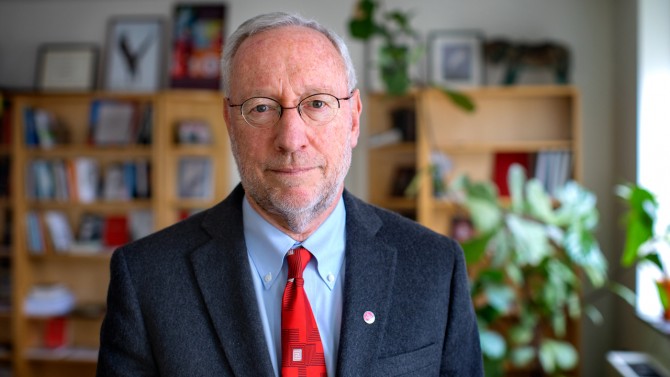Provost announces School of Public Policy, superdepartments
By James Dean
Concluding a multiyear review, Provost Michael I. Kotlikoff has announced a pair of initiatives intended to chart the future of social sciences scholarship and education at Cornell.
The university will launch the Cornell School of Public Policy, a separate school with its own dean who will report to the provost. In addition, “superdepartments” drawing faculty from multiple colleges or schools will be created or expanded in the disciplines of economics, psychology and sociology.
The moves are expected to lead to new programs and collaborations that elevate Cornell’s excellence and prominence, addressing the long-standing challenge of connecting faculty within the core social science disciplines who are based in multiple units across the university.
Those concerns were the focus of a review the provost began in 2016, involving a series of faculty committees, which followed numerous reports produced in preceding decades.
“After many, many years of analysis and discussion, we are taking bold, transformational steps and making significant investments that will build the future for the social sciences at Cornell,” Kotlikoff said.
President Martha E. Pollack supported the proposals, which were approved Feb. 27 by the Cornell Board of Trustees.
“I appreciate the hard work that went into developing these proposals with thoughtful input from many dedicated faculty, students, staff and alumni,” Pollack said. “The new School of Public Policy will both enhance Cornell’s reputation as a leader in public policy and train our students with broad policy perspectives that will serve them in the public and private sectors. I see these changes as key steps in advancing our founding mission to discover and apply knowledge in support of the public good.”
The announcement came weeks after the Social Sciences Implementation Committee delivered recommendations strongly supporting the superdepartments but split on a public policy entity.
Kotlikoff had charged the committee with evaluating the best public policy structure – either refocusing the College of Human Ecology into a public policy college or creating a policy school shared between CHE and the College of Arts and Sciences.
A majority of the committee favored the former option but expressed “great concern” about its potential impact on the four CHE departments that did not view themselves as aligned with a policy mission. Students, faculty and alumni affiliated with those departments expressed the same concern, as did the Faculty Senate, which believed a school would better integrate faculty from across the university.
Kotlikoff said his decision responded to that feedback. First, CHE will remain an independent, multidisciplinary college. And the new School of Public Policy, he said, preserves the Implementation Committee’s primary goal: an entity with the profile and structure necessary to control its own budget and hiring, and to attract a high-caliber dean. The school, Kotlikoff added, will provide clarity and allow innovation, with new programs that will attract students.
The school will start with faculty from the Department of Policy Analysis and Management (PAM) and Department of Government, who will remain affiliated with their current colleges, CHE and A&S, respectively. The faculty will expand over time to include scholars from other departments involved in areas such as global policy, global development and labor policy, and add new hires, Kotlikoff said. The school will house the Cornell Institute for Public Affairs’ Master of Public Administration program and is expected to start a new Master of Public Policy program.
The new school’s immediate areas of strength, Kotlikoff said, will include health policy, international and domestic policy, and sustainability, with a clear mission of public engagement and strong connections to campus expertise in global development and labor policy. The university will work over the long term to develop a combined space for the school.
For now, Kotlikoff plans to appoint a faculty executive committee to help establish the school and to consult on the search for a founding dean. The School of Public Policy could open as soon as the spring or fall of 2021, he said.
“It’s not going to develop overnight; we’re going to have to invest in it and create the structures for the school,” Kotlikoff said. “But I’m confident in the long run, this will be a much better solution for Cornell and enhance our impact on some of the world’s most challenging problems.”
Similarly, he said, the new superdepartments seek to reduce fragmentation that has limited Cornell’s visibility, impact and strategic direction in the social sciences.
“This will create the ability to recruit faculty into larger cohorts and gain from that unification of scholars in the same disciplines,” Kotlikoff said.
Economics – already a superdepartment involving faculty from A&S and the ILR School – will expand to include economists from PAM. A new psychology superdepartment will combine A&S faculty with CHE’s human development faculty, and sociologists from A&S will join forces with those in PAM. Faculty trained in those disciplines from ILR, the College of Agriculture and Life Sciences, and Cornell Law School could also join the superdepartments.
Kotlikoff said similar collaborations over the years have proven successful in the physical and biological sciences.
“One of the geniuses of Cornell is our ability to collaborate across colleges,” Kotlikoff said. “Cornell’s combination of contract and endowed colleges has forced us to find ways to work together, enhancing our scale and enabling combined strategic planning. It is time to apply some of these time-tested solutions to the social sciences.”
Kotlikoff will appoint subcommittees to work with the provost’s office and relevant deans to launch the new superdepartments within a year, by the spring of 2021. Kotlikoff has promised investments over the next five years to enhance and balance the departments’ faculties.
“These transformational changes set us up for the future,” Kotlikoff said, “positioning us to recruit the next generation of social scientists at Cornell.”
Media Contact
Get Cornell news delivered right to your inbox.
Subscribe

